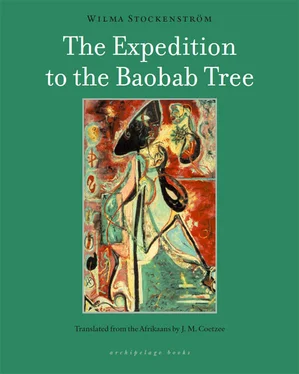On the whole I could not complain about my place and the scope given to me in his household. I considered myself a lucky, privileged person, without rights but not wholly without choice. Not all slaves by far were as well cared for as those of this house, as I could attest from experience. Granted, we slept in an outside building, but it was built of stone like the main house. Our floors were not covered with carpets. We slept on thick coir mats. There were no ornately carved low tables and red-copper urns standing about in our rooms. But compared with the slovenliness and stuffiness and sour mud and the holes in the wind-torn roof of my previous owner’s slave huts, I could certainly consider myself lucky. Add to this my privileged position which I knew very well how to maintain, and the spick-and-span organization of the house, and I really had little to grumble about.
On the terrace roof where, thanks to my position as favorite, I could freely repair without permission, I liked to spend the sunset, when I could fit it in. At such times I would look at the glow over the interior out of the cloudy fierceness of which I had come, and on the opposite side at the darkening sea that had called me, and I would stand caught in perfect balance in the interlight. In inescapable transitoriness I could have dissolved like a phantom into the swift black. I was marked out in peacefulness, and whole. When a dog barked, I started out of my rumination and breathed deeply, salty air, smell of crayfish, smell of damask rose, smell of clove and broadbean. I could smell the first early stars. For that reason I could not understand why I might not keep my children. For that reason I had to accept that grown children were what I lacked.
For that reason I felt relieved that I had not yet fallen pregnant again.
And thankful that I did not belong to the eldest son, whose nature was so utterly different from his father’s, for the stories of maltreatment were not just stories. I myself had seen the open raw weals on the shoulders of some of his slaves, and had stealthily nursed them. It was as if the eldest son took out his annoyance on men in particular — in fact he had no slave girls. Not that he would find need for them in his father’s house, but still I thought it strange. We, the slave girls, scarcely existed for this surly young man with his cane eternally in his hand. He had a blunt way of talking to us when he really had to, for example when he had to ask one of us to pass a dish at table, and he did not partake in the amusing man-to-woman pleasantries of the writers. He sat there shyly, half-leaning on a cushion, nibbling, and all that really animated him was talk about the history of other countries. Then his eyes glowed beneath the thin line of his eyebrows. And then he closed his eyes. The eyelids looked defenseless with their short curly lashes when his face relaxed so unexpectedly, and like a child he scratched in his ear with his little finger, and shook his head, and his eyes opened in a stare.
A good thing I had so little to do with him. To me he seemed clumsy, closed off. A good thing I could never have dreamed I would one day spend such a long stretch of my life in his company: and even after that, after he had shamefully abandoned us and taken along everything left over, even after that I could not fathom him. He had a habit of bumping the slaves, or tripping them and grinning when they fell with a heavy pack of provisions. Maliciously he beat the sanga cattle till the stranger intervened and virtually came to blows with him and wrestled with him. He made me shudder. Whether he left me alone because slave girls scarcely existed for him, or whether he did not dare assault me because I was at the time the stranger’s property, I did not know. Do not know even now. I felt protected in the company of my stranger.
Distracted with despondency, I accosted the stranger the first time he came after the youngest son’s death and begged him to buy me before I was disposed of at the market. That is what I feared would happen to me, that I would again have to go and stand in that place of shame. I remember how I gestured hysterically, how shrill my voice sounded, and later how tremulous; then I shut up. Too anguished, too tired out by struggling in the grip of uncertainty. Overconscious of being obtrusive, rash. The short interval before he answered was laden with my intensity, my violent beseechings were an indecorous wrangling with his reserve, my clammily waving hands helpless feelers before his face, my kneeling attitude a too obviously toadying trick.
When he assured me I would not be auctioned off, how lovely the flash of transition from uncomprehended relief at first to comprehension and calm. I brought a corner of my garment to my mouth to stifle my indecorously unrestrained sobs, and, to all appearances calmly thanked him while choking on my feelings and wanting to scream and rejoice crazily. Subdued I left him.
For he came again as I believed he would; but this time there was a motive I could not guess, for I assumed without thinking that he had come to do his everyday business, come to buy up iron and copper in exchange for rolls of silk and cotton, come on the trade wind at the head of the little fleet of dhows under his command as of old, come from afar across the rippling blue-green where other trading cities on other coasts shrouded themselves in a haze of strangeness — that is how I thought. That he and his crew had come to unload one cargo and take on another.
I could not know that this time he would temporarily relinquish his command over the sailors and hand it over to a subordinate in order to undertake a journey in the opposite direction from the white flutter dance of the brown-veined butterflies over mountains and plains, nobody knew whither, nobody knew why. And no one knew why he had allowed himself to be talked into it. He provided no reasons. He went. I accompanied him, his recently acquired latest possession. I became part of the extensive organization that kept him and the eldest son busy and had them doing calculations till late at night by oil lamps and had them unraveling the possible, the probable, the actual and the enigmatic and weighing them up against each other till one grew bored. The possible and the impossible fell, rose and hovered in balance. The particulars heaped up and up, and an idea suffocated, and new ideas were sought, and eventually the question why was of absolutely no importance. Fancy and the profit motive. Childish dreams. Longing for the faraway. Elaborate estimates. A rebellious streak. Perhaps the last.
So. For that reason we departed for the frontiers of the spirit. Invertebrates about to change homes, that is what we were. Shellfish sliding over the sand. A colony of sea anemones slithering over dry rocks on their single feet. Fish walking on their fins. Wobbling salt-scaled coelacanths. Wailing dugongs.
Our procession of bearers and cattle and sedan chairs with passengers on the shoulders of bearers wound into the interior on the way to the great ocean that booms at the uttermost limits of the world. It could not be too far, as determined by the eldest son and the stranger, rationally, with the help of their maps. It could not take a lifetime, they calculated. Taking everything into account, it ought in fact to be a shortcut to the land of the able mariners who had recently called at the city and boasted of their hardships on the billows of an immense unknown sea, and who could prove on the evidence of the numerous cases of scurvy among the crew that they came from the utmost limits of the utmost limits.
To us it seemed as if they suddenly appeared out of nothing, as if they slowly came shifting across the foil of the sea, oh so slowly, in bulky caravels driven by a mass of patched sails in the tackling of which we saw the crew scrambling with apelike agility. We were not impressed. Or did not make it apparent. But in spite of this gathered on the beach or climbed to the terrace roofs. If you were rich you ordered a sedan chair, if you were a perky child you climbed the bow of a coconut tree, if you were a carpenter you dropped your tools and forgot your commissions and stood up, if you had a suspicion of new trade connections you locked up your trading house and with a small retinue of scribes sauntered, calm, chatting, exchanging greetings, pretending boredom, to the spot, more or less, where they would drop anchor in our treacherous bay. What can they offer that we do not have? was the general feeling, and the city did not seethe with excitement, not so that it could be seen, and the new arrivals were nonchalantly made welcome, not suspiciously, but still … Not so that it could be seen.
Читать дальше












